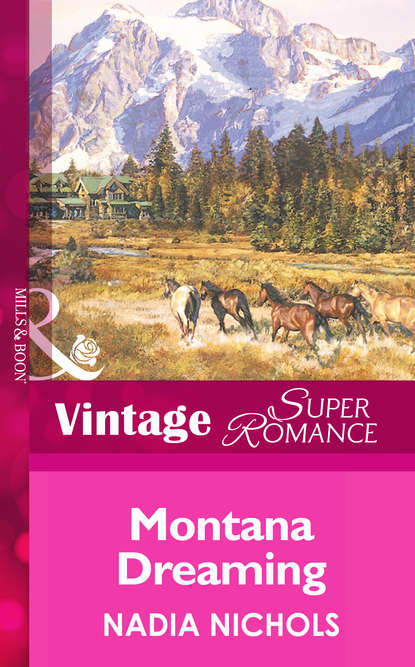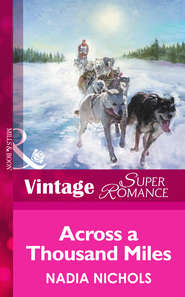По всем вопросам обращайтесь на: info@litportal.ru
(©) 2003-2024.
✖
Montana Dreaming
Автор
Год написания книги
2019
Настройки чтения
Размер шрифта
Высота строк
Поля
He’d had to jump into the water to fetch his hat. It’d been cold, too. Early spring, the ice barely out. He’d retrieved it, though, and he’d never said another word about her summer job in Arizona.
As he came down the slope Jessie spotted another man far above, nearly hidden in the trees, but it was Guthrie she watched. And then he was close enough to touch her. He sank to his knees, braced his palms against his thighs and struggled to catch his breath.
They stared at each other, his shoulders heaving, a pandemonium of emotions churning in her.
“You all right?” he asked, as soon as he could speak.
She nodded. “I’m fine, but Blue’s hurt,” she said.
“How bad?”
“Bad.” And then, to her absolute mortification, her eyes filled with tears. She turned away, blinking back their sharp sting.
“It’s okay, Jess,” he said. “We’ll get her to Cooper. He’ll fix her up. What about you? Badger told me you busted your arm a few days ago.” She gazed down at Blue, unable to speak past the ache in her throat. Tears spilled down her cheeks, and silently she damned herself for being weak. “You’re all wet,” he said. “We need to get you home and into some dry things,” he said. He touched her shoulder. She stiffened and shook her head.
“Don’t.”
He pulled his hand away. “Let’s have a look at Blue,” he said. Jessie tried to unzip her parka but couldn’t with just one hand. She dropped her eyes while Guthrie did it for her, then gently extricated the little cow dog from her warm cocoon. “Hey, Blue,” he said as he drew out the dog gently and cradled her in his arms. “Hey, old girl. Easy… It’s all right, I’ve got you.” He glanced at Jessie. “What happened?”
“Bear,” Jessie said.
“She sure enough looks clawed,” he said as he stroked Blue’s head. “Lost a lot of blood?”
She nodded. “She’s pretty weak. I tried to bind up the worst wounds.”
“You did just fine. She’s tough. She’ll be all right.”
Jessie raised her brimming eyes to his and shook her head. “She can’t die on me. Not now.”
“She won’t. We’ll get her home, take her to Doc Cooper’s…”
They heard the sound at the same time and turned their heads simultaneously toward it. It was faint but growing louder, a rumble that sharpened and defined itself as it approached. A helicopter snaked out of the ravine from which she’d just walked. It came into view barely above tree height, skimming right over the top of McCutcheon, so close and looming so large that both she and Guthrie, though already on their knees, ducked. Instead of passing straight overhead, it circled and hovered for a few moments, long enough for her to see an arm wave out the passenger-side window and for her to read the big letters on the side.
Yellowstone HeloTours.
Jessie lifted her own arm in startled response, wondering what the devil Joe Nash would be doing flying his sight-seeing clients way out here. He seemed to be looking for a place to land. The big machine thumped its way downslope about five hundred feet from where she stood and then, in a clearing scarcely big enough for the spinning helicopter’s blades, it set down. The passenger jumped out and raced toward her in a crouch. He was dressed in a green wool Filson jacket that sported a prominent and familiar shoulder patch.
Jessie rose to her feet and stared with disbelief at the entire spectacle. As Comstock drew near, she turned to Guthrie, who was still on his knees, holding Blue, and asked in a rush of remembered anger, “What are you doing here, anyway? I thought you ran off to Alaska!”
CHAPTER FIVE
BEN COMSTOCK HAD BEEN a warden for nearly twenty years. He’d passed through all the standard phases a warden goes through, from the idealism of youth to the disillusionment of experience. He’d seen it all, and he’d long since stopped believing he could single-handedly protect and defend the wilderness and wildlife of Montana. Even though he was aware that Joe Nash had broken just about every game law in existence, slyly eluding all the traps Comstock had set for him, he never hesitated to call on Joe when he needed his services. And right now, he was glad he had. He had both considerable affection and tremendous respect for Jessie Weaver. He’d known her since she was a little girl, having spent many a pleasurable evening at the Weaver ranch, playing poker at the kitchen table and sharing good sipping whiskey with her father.
He’d heard from Bernie that she’d just sold the ranch. For her to do it had taken a lot of guts. He hadn’t really believed she’d have deliberately ridden out in the midst of a freak autumn snowstorm, hoping she’d freeze to death up on that mountain she loved, but the doubts had nagged at him ever since he’d gotten the call that she was missing. She had to be pretty depressed after losing her father, breaking up with Guthrie Sloane and now losing the ranch, as well.
No doubt his relief at finding her alive and well showed plainly on his face as he approached. “Good to see you, Jessie,” he said. “Can you make it to the chopper?”
“I’m fine, but my cow dog’s hurt.”
Guthrie struggled to his feet, holding the injured dog, and Comstock eyed him keenly. He was looking a mite winded, Guthrie was. Hell, that was to be expected. The boy had run more than ten miles of rough mountain trail on snowshoes, searching for his girl. Guess he had a right to appear wrung out. But that wasn’t the whole of what was ailing him, either. He felt a strong twinge of paternal pity for Guthrie Sloane. “Sorry to have taken so long getting our tails up here,” he said. “The storm pretty much shut everything down. You all right, son?”
A curt nod. “McCutcheon’s up on the hill. He’s tuckered out. Maybe you could give him a ride back to the ranch.”
“The chopper carries four, but I’m sure we can fit you in, too. Jessie doesn’t weigh much more than that dog of hers.”
“No, thanks. It’s not that far to the main road, and you’ll make better time with a lighter load. You’ll take care of Jess?”
“You know I will.” Comstock nodded, gently lifting the injured dog out of Guthrie’s arms. “I’ll get them loaded while you fetch McCutcheon down.” Squinting against the glare of the sun on the snow, both men glanced to where McCutcheon had last been seen. “Oh, jiminy,” Comstock said. “You see what I see?”
Guthrie’s eyes narrowed. “Damn! You suppose he’s had a heart attack?”
“Well, he’s definitely down, and the way he’s lying doesn’t look quite natural, does it?”
Without another word Guthrie started slogging, head down, back up the slope.
BADGER HAD SEEN a lot of things in his seventy-eight years, but he’d never seen a helicopter land up close. He heard the big machine appraoch long before it set down in front of the Weaver ranch, causing a stampeding panic among the horses corralled next to the pole barn. He stood on the porch, hands shoved deep in the pockets of his old sheepskin coat, and watched as Ben Comstock jumped out of the helicopter’s side door. He reached up and handed down none other than Jessie Weaver.
Badger nodded a greeting to Comstock. He’d known darn well that Jessie would be okay. She probably would’ve walked out herself in another hour or so. The chopper had passed overhead not ten minutes ago, so she had to have been close to home when they found her. ’Course, a fast machine like Joe Nash’s could cover some ground in ten minutes.
“Badger!” Jessie said as she climbed the porch steps. She stopped in front of him and stared, then glanced past him to where Steven stood in the kitchen doorway, watching silently. “If the both of you are here, I guess maybe the whole town’s in the kitchen.”
“No…no, they’re not. The state police and Park County Search and Rescue are at the Longhorn, waitin’ on Comstock’s call.” Badger shifted under the burn of her eyes. Jessie didn’t like an audience. He understood that better than anyone. Still, she hadn’t rounded on that Indian lawyer. In fact, unless he’d gotten too old to read sign, Jessie and that lawyer were real glad to see each other.
“Badger, I need you to drive out and meet Guthrie,” she said. “He’ll be coming onto the road about three miles shy of Katy Junction near the Bear Creek crossing. You know the place.” She was unbuckling her chaps one-handed as she spoke. That done, she flung them, dark and heavy with meltwater, over the porch railing. Badger stood back, fidgeting. He knew better than to offer to help.
“I’ll get right out there,” he said.
“I expect he’ll be pretty tired by the time he gets to the road,” she said, straightening. “How’re the horses? Did Billy make it back?”
Dang, but she looked wrung out! Her eyes were as intense as ever, but they were shadowed with pain and fatigue, and improbable as it seemed, it appeared as though she’d been crying. This upset Badger more than anything else. Jessie Weaver never cried. Never. “Billy’s here and the horses are all fine. Fed and watered,” he said. “C’mon inside and get out of them wet clothes—warm yourself up. You’ve had a time of it. That’s plain enough to see.”
She shook her head, chin lifting, shoulders squaring. “Blue’s been hurt. Got all clawed up by a grizzly. Joe’s going to drop us at Cooper’s on his way to flying McCutcheon to the hospital in Bozeman. He fell and hurt his ankle. Looks broke to me.”
“I could drive you to the veterinarian,” Steven said, speaking for the first time. He stepped out onto the porch, thumbs hooked in his rear pockets and head canted slightly to one side, but again Badger wasn’t fooled. There was nothing casual about the way that Indian lawyer felt about Jessie.
“Thanks, but it’ll be quicker in the chopper, and Joe’s offered.” She looked at him and the faintest of smiles traced her lips. “Thanks,” she said once more. She turned and almost as an afterthought as she descended the porch steps, she said over her shoulder, “I never did find my mares.”
DOC COOPER WAS DRUNK. It was nearly 11:00 a.m. and he’d already downed nearly a fifth of good Kentucky bourbon, the kind his daddy had drunk way back when times were easy and the land was bountiful and ranchers could pay their vet bills and people still ate red meat and family farms were the mainstay of an honest and hardworking nation. He was drunk and singing a religious ballad his daddy had sung a long time ago about a wheel way up in the middle of the sky.
“Ezekiel saw the wheel, way up in the middle of the sky.
Ezekiel saw the wheel, way in the middle of the sky!”
Those were the only words that he could remember, because he wasn’t an overly religious man himself, but that was okay. He didn’t know what the wheel was about, either, but that was all right, too. There was snow on the ground, October was nearly played out and the winter would be long and dark and cold. There was nothing else it could be. All the winters out here were the same. The wind blew, the temperature dropped, the snow fell, animals died. Animals were always dying. In fact, anything at all that was alive was always getting hurt or sick or old, and in the end they always died.
And now he’d lost his best friend. A phone call in the middle of the night from Drew’s wife, Ramalda, who could barely speak English, but she’d found just enough words to tell him that Drew wouldn’t be makin’ it to the Halloween Stomp this year. Dammit all, it was enough to drive a man to drink! He raised the bottle for another sip, then sang some more.
“Ezekiel saw the wheel, way up in the middle of the sky.











